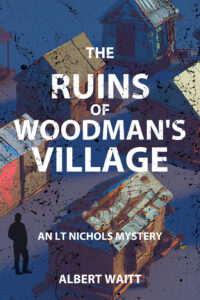A big welcome to Albert Waitt, a fellow Level Best Book author, who hails from Maine. (And he went to school in my favorite city, Boston.) He’s my guest today, and he’s writing about desires and crime fiction. Take it away…
You may be asking yourself, “What does Aristotle have to do with crime fiction?” and “Am I sure I even want to read this?” To answer the second question first, sure you do. It’s short. And to answer the first question, he’s got a lot to do with it.
 It’s all about character. “Aristotle rather startlingly claimed that man is his desire,” notes Janet Burroway in Writing Fiction. Tom Bailey observed in On Writing Short Stories that, “the need that makes him or her, can be termed the character’s motivation, and this motivation is formed by the complexities inherent in any character’s often contradictory aspects of self.” It comes down to this: What does a character want and what will they do to get it? A character’s desire fuels their actions, and those actions, in turn, reveal character. Readers are interested in what a character says and does, because it shows them who they are. They become real.
It’s all about character. “Aristotle rather startlingly claimed that man is his desire,” notes Janet Burroway in Writing Fiction. Tom Bailey observed in On Writing Short Stories that, “the need that makes him or her, can be termed the character’s motivation, and this motivation is formed by the complexities inherent in any character’s often contradictory aspects of self.” It comes down to this: What does a character want and what will they do to get it? A character’s desire fuels their actions, and those actions, in turn, reveal character. Readers are interested in what a character says and does, because it shows them who they are. They become real.
Sure, it could be argued that much of crime fiction is the same: The hero wants justice, and criminals are driven by—take your pick—greed, jealousy, revenge, etc… But in great crime fiction, a character is portrayed with dimension. The question of to what length a character will go to satisfy their desire is what keeps a reader turning pages. Think of some of the great characters in crime fiction, and one will find desire and a price paid to satisfy that desire. A fine example is Michael Connelly’s Harry Bosch. His desire for justice is unyielding, his personal history reveals why it exists, and his resulting creed of “Everybody counts or nobody counts” leaves him with enemies on both sides of the law. Harry’s desire, acted upon, brings tension and suspense to every page of a Bosch book.
My approach to writing starts with character. I consider what they want and what they will do to get it. In The Ruins of Woodman’s Village, the main character, Police Chief L.T. Nichols, is an everyman, reasonable almost to a fault in his quiet, coastal Maine town. But when two teenage girls go missing at the height of tourist season, he faces a challenge. The girls are outcasts, and many around him are willing—and even encouraging him—to let it drop. But, he refuses. Why? Because his sense of duty won’t let him. As he struggles to find the girls, he discovers that he has something to prove to his town and to himself. The worse it gets, the more he digs in. And it doesn’t come without cost.
One only needs to recall the closing scene in the film version of Hammett’s classic, The Maltese Falcon, to realize how integral desire is to crime fiction. When Sam Spade is asked what the chipped black bird statuette in his possession is, he—echoing Shakespeare—replies, “The stuff that dreams are made of.”
 Author Biography: Albert Waitt is a writer based in Kennebunkport, Maine. Waitt’s first novel, Summer to Fall, was published in 2013 by Barrel Fire Press. His short fiction has appeared in The Literary Review, Third Coast, The Beloit Fiction Journal, Words and Images, Stymie: A journal of sport and literature, and other publications. Waitt is a graduate of Bates College and the Creative Writing Program at Boston University. Experiences ranging from slinging drinks, teaching creative writing, playing guitar for the Syphlloids, and frying clams can be found bleeding through his work.
Author Biography: Albert Waitt is a writer based in Kennebunkport, Maine. Waitt’s first novel, Summer to Fall, was published in 2013 by Barrel Fire Press. His short fiction has appeared in The Literary Review, Third Coast, The Beloit Fiction Journal, Words and Images, Stymie: A journal of sport and literature, and other publications. Waitt is a graduate of Bates College and the Creative Writing Program at Boston University. Experiences ranging from slinging drinks, teaching creative writing, playing guitar for the Syphlloids, and frying clams can be found bleeding through his work.
Synopsis of The Ruins of Woodman’s Village When twin sisters go missing at the height of tourist season, Police Chief Tim Nichols’ summer of patrolling beaches comes to an end. A desperate search takes him from seaside bars and abandoned farms to million-dollar estates and cobbled-together shacks. As Nichols doggedly unearths information, he finds a darkness coursing through Laurel, Maine’s sunny, tree-lined streets. He races to piece together the girls’ disappearance, knowing that doing so may tear the façade off his postcard-perfect town.
Where you can find Albert on Social Media:
Amazon Link: https://www.Amazon.com/dp/B0BX1H597K
Website Link: HOME | albertwaitt
Facebook: Albert Waitt | Facebook
Twitter: @AlbertWaitt
Instagram: @albertwaitt
